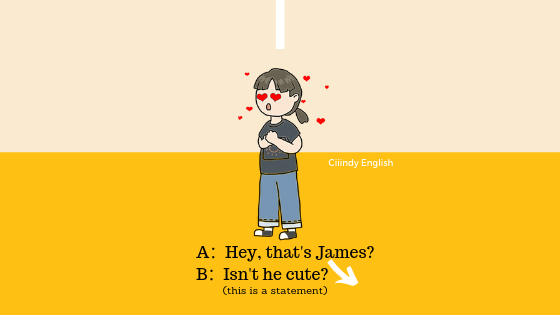Intonation can change the meaning of the sentence
- Ciiindy English

- Jun 5, 2019
- 3 min read
Updated: Jun 6, 2019

When you say a sentence, what you say is important (content), but also how you say it (intonation).
You can say the sentence with a completely different or opposite meaning.
For example, "I beg your pardon"
If you end with a rising tone: "I beg your pardon?"(↗)
- You make it a question: you are asking the person to say the sentence again.
If you end with a falling tone: "I beg your pardon."(↘)
- You are apologizing and saying sorry to someone.

Intonation is the rise and fall of your voice when you speak. At the end of the sentence, if your intonation is:
Falling (↘): used for most regular statements and questions that are not yes or no questions
Rising (↗): used for asking a yes or no question or to show disbelief or anger
How Intonation Changes Meaning
A:Can you get my towel? B:Sorry?(↗)
Sorry? = means I didn't hear you. Could you say that again?
A:Can you get my towel? B:Sorry. (↘) My hands are full.
Sorry. = means I cannot help you

Compare the tones of the words in a sentence.
For example, "I work for the company"
"I (↗) work for the company."
- You are implying that other people do not work in this company.
"I work for (↗) the company.
- You are implying that you are working here and that you are not here to play or fool around.

Interrogative words like:
- who
- which
- what
- how
- when
- where
- why
You can emphasis these words with intonation and it would change the whole meaning.
"Who", for example,
A:Mrs. Clinton asked some students to present their projects tomorrow.
B:Who?(↗)
Who? = means I didn't hear you. Could you say that again?
A:Mrs. Clinton asked some students to present their projects tomorrow.
B:Who?(↘)
A:Maybe you or Ken would like to present first.
Who? = means who do you think is suitable / who are you referring to.

Tag Questions = a statement + mini-question. Used to ask for confirmation.
A:You will come to the party, won't you?(↘)
B:Yes, I will.
-Falling tone: asking for confirmation; I know I have invited you to the party but want to make sure you will come.
A:You will come to the party, won't you?(↗)
B:Yes, I will. / No, I won't.
-Rising tone: asking with no confidence but hoping that you will come, so the answer may be yes or no.

Interaction with others
A:Are you Mr. Smith?
B:Yes.(↘)
A:Here you go.
Yes. = closed question; if the person has nothing more to say / questions to ask, the conversation is over.
A:Are you Mr. Smith?
B:Yes.(↗)
A:Oh, you have a message.
Yes. = asking the person why they are looking for you.
Rhetorical question: questions that is asked to make a point rather than waiting for an answer.
A:Do you think George is ready to lead the sales team?
B:If George is not, who is?(↗)
Even though "who is?" is used here, the person is stating that there is no better person for leading the sales team.
A:Hey, that's James?
B:Isn't he cute?(↘)
Here, the question is not really a question, but a statement saying Melissa is really cute.

Use your instincts to decide with the "whole picture" of the conversation what the meaning is.
Quiz time! Try to answer this question:
James: Katie looked very tired these days.
Lisa: She looked OK to me (↗) .
Q : What does Lisa think of Katie?
〔A〕She saw Katie sleeping at work.
〔B〕Katie said she was fine.
〔C〕Katie told Lisa she was tired.
〔D〕She thinks Katie is fine.
.
..
...
....
......
.......
........
........
.........
..........
...........
............
..............
...............
................
...................
.....................
......................
.......................
.........................
.............................
...............................
....................................
Answer is (D) = The tone rises on "me" which means Lisa does not agreed with James.
You think Katie looks tired, but she seems fine to me.
↘ Did you get the answer right? Comment below!↙



C
I am James and I got the right answer. Rising tone mean Lisa has different comment from James.